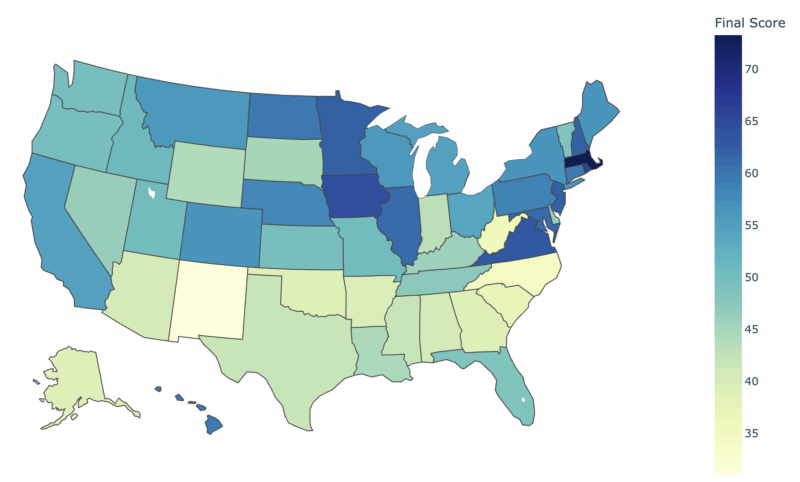Written by James Yoo
We want to help you make educated healthcare decisions. While this post may have links to lead generation forms, this won’t influence our writing. We adhere to strict editorial standards to provide the most accurate and unbiased information.
Mental Health for Teens
Being a teenager has never been easy, but teens today face even more challenges that can be serious threats to their mental health. Not addressing mental health issues can have serious negative effects, but parents and teens can work together to help everyone stay strong and healthy.
Bullying and Cyberbullying
Bullying is something that more than one in every four students in the United States has faced at school. Bullying victims can become so despondent that they think about suicide. Bullying can happen face to face, or it can happen online, which is called cyberbullying. Cyberbullying involves bullying through text messages, social media, email, or elsewhere online. Cyberbullying may involve harassment, revealing private information, impersonation, and cyberstalking.
Signs of bullying can include:
- Drastic changes in sleeping or eating habits
- Dropping grades
- Strange bruises
- Talking about self-harm
- Missing possessions such as jewelry or electronics
- Damaged clothing
Relationships
Teen romances are often strong while they’re going on, and they can be devastating when they end. A bad breakup can cause major mental health issues for teenagers, which might impact grades and behavior at home. Self-harm and suicide are also potential results of a breakup.
School Stress
School typically involves some amount of stress as you’re trying to learn, get good grades, manage peers and friendships, and participate in extracurricular activities such as sports and clubs. If teenagers don’t know how to handle this stress, they might experience higher than average stress levels, which can lead to anxiety and depression. Parents can help with stress levels by keeping communication lines open and lightening the load when possible.
Family Issues
Family issues can cause mental health issues for teenagers, too. If your parents divorce or the family has financial problems, depression and anxiety can result. Parents should take steps to protect and insulate teenagers from worrying about parental relationships and financial concerns.
Recognizing Depression
If depression sets in, it’s important to recognize it early to deal with it. A teenager might engage in excessive smartphone use, have slipping grades, stop seeing friends, exhibit violent behavior, or turn to other reckless behaviors such as unsafe sex, drug use, or drinking. If depression is a possibility, parents and friends should try to communicate with the teen, guiding them toward professional help if needed.
Recognizing Anxiety
Anxiety disorders are a possibility for both boys and girls. Anyone suffering from anxiety can experience both mental and physical symptoms that have a negative impact on your life. Meditation and relaxation can be helpful for anyone who is feeling anxious. If anxiety continues to be a problem, professional help can be beneficial.
Recognizing Body Image Issues
Society values thinness, so many teenage girls fall victim to body image issues. It’s important to ignore media representations and work toward feeling comfortable with your own body. Parents and friends should watch for signs of body image issues, such as skipping meals and engaging in bulimic behavior to control weight. Disordered eating can lead to serious health issues. Early intervention and health care are important to address eating disorders caused by a negative body image.
Substance Abuse and Addiction
Teens may deal with anxiety and depression by turning to drugs or alcohol, which are also harmful to your health. Although illegal drug use is down among teenagers, alcohol use and abuse continues to be a serious problem.
Smartphone and Social Media Addiction
Nearly three-quarters of America’s teenagers have a smartphone, and overuse of this technology is connected with depression. Teenagers who participate in sports and other physical activity tend to be happier than those who spend more time on their mobile devices. A smartphone addiction may even lead to a chemical imbalance in the brain. When possible, limit smartphone use to two hours or less a day.
Self-Harm
Self-harming behaviors such as cutting can also be signs of a mental health problem, as these behaviors may be used to manage anxiety and depression. A teenager who turns to self-harm is likely to need help from a medical professional to learn healthier coping skills.
Suicide
If a teenager shows signs of depression and talks about suicide, intervention is crucial. A suicidal teenager might have a fascination with death or might start giving away their favorite possessions. They might also stop doing things they once enjoyed or start behaving more recklessly. If you suspect that a friend is contemplating suicide, say something: Ask them about how they’re feeling, and encourage them to talk about their problems. If you think they’re in immediate danger, get help from a professional right away.
Tips for Maintaining Good Mental Health
- Keeping lines of communication open is crucial. Resist the urge to lecture, instead showing patience and kindness. Stay calm, and be a good listener.
- Teenagers should take care of their physical health by eating healthy foods and getting daily exercise. Doctors recommend that teenagers get 60 minutes of exercise every day, and this can help with weight management as well.
- You also need between eight and 10 hours of sleep every night to function well. Sleep deprivation can lead to depression, anxiety, and even reckless behavior.
- If a teenager struggles with mental health issues, professional health care is crucial. Therapy and counseling can be effective. Sometimes prescription medication may also be necessary, under a doctor’s supervision.
Resources
- Teen Mental Health
- Crisis Text Line: Get Help Now
- Common Mental Health Disorders in Adolescence
- Child and Adolescent Mental Health
- Help Youth Change the Way They Look at Mental Health
- Mental Health
- For Young People Looking for Help
- Overview of Depression
- Mental Health Among Children and Youth
- The Teen Mental Health Crisis in America
- Social Media Use May Increase Risk of Mental Health Problems
- Student Guide to Mental Health: How to Get Help
- Teen Depression
Thank you for your feedback!








